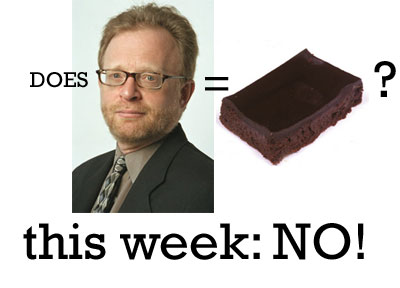
WEEKLY QUESTION: Will this week’s NYTBR reflect today’s literary and publishing climate? Or will editor Sam Tanenhaus demonstrate yet again that the NYTBR is irrelevant to today’s needs? If the former, a tasty brownie will be sent to Mr. Tanenhaus’ office. If the latter, the brownie will be denied.
And now onto this week:
THE COLUMN-INCH TEST:
Fiction Reviews: 1 two-page review, 1 one-page review, 1 one-page poetry review, 2 half-page poetry reviews, 3 half-page reviews, one half-page crime roundup. (Total books: 12. Total pages: 7.)
Non-Fiction Reviews: 1 two-page review, 7 one-page reviews, 1 half-page review. (Total books: 10. Total pages. 9.5.)
The real question to ask here is whether Tanenhaus and Keller’s efforts to make the NYTBR more “accessible” by concentrating on shorter reviews is really a subconscious campaign to kill off meaningful fiction coverage. After all, when we consider that nonfiction coverage has received roughly a full page review for each title, while fiction and poetry are increasingly capsulized and deemphasized, what we have here isn’t necessarily “accessibility,” but one in which, more often than not, the dumbest books of our time are seriously considered. How else to explain a book as preposterous as Moneymaker: How an Amateur Poker Player Turned $40 Into $2.5 Million at the World Series of Poker getting coverage over literature?
What next, Sam? A retrospective on the complete works of Dale Carnegie? Chuck Klosterman called in to assess L. Ron Hubbard’s literary subtext ? Dave Pelzer reviewing memoirs?
I must point out again that there is a fundmental difference between People Magazine and The New York Times. The former is intended to soothe bubbleheads with tedious gossip while they wait for their nails to dry in a salon. The latter — well, some of us who subscribe on Sunday sort of expect it to stand for something.
Of course, retrospectives on Frank Conroy’s teaching career do go a long way towards establishing credibility. It serves to provide perspective to readers who might not be aware of writing programs or Conroy’s particular character. Likewise, Lee Siegel’s Freud essay, which suggests a number of points that I’ll respond to shortly, indicates an effort to shift things to a conversational level.
But Tanenhaus needs to understand that he cannot have things both ways. He must decide whether the NYTBR is a serious weekly book review or something to be placed near the john next to a stack of Maxims. One of the reasons the Brownie Watch exists is to express our hopes that it does indeed represent the former.
But this week, yet again, Tanenhaus has decided otherwise.
Brownie Point: DENIED!
THE HARD-ON TEST:
This test concerns the ratio of male to female writers writing for the NYTBR.
It’s a little better than last week. But ten male writers to seven females still troubles us, particularly when the nonfiction section again demonstrates that cold warriors are ready to hammer out their arguments at the old boy’s club while the ladies stay in the kitchen covering fiction and memoirs. While I must confess that it’s good to see the nonfiction crop this week isn’t so astringently policy-based, we still believe that some balance is in order.
Brownie Point: DENIED!
THE QUIRKY PAIR-UP TEST:
Nell Fruedenberger is an inspired choice to cover Stewart O’Nan’s latest. Like last week’s Lethem essay, Freudenberger is personal, candid about how O’Nan breaks the rules, and comes across as a passionate reader. Again, it’s the kind of book reveiw that is critical without coming across as a humorless blowhard. It represents a kind of invitational feel that offers a balance between literacy and democracy.
For Freudenberger alone, Sam gets the brownie point.
Brownie Point: EARNED!
CONTENT CONCERNS:
I like Elmore Leonard as much as the next guy, but do we really need to be reminded about how entertaining he is or how jazzy his dialogue he is every time a new book comes out? The first half of Chip McGrath’s review reads almost as a hodgepodge of all other Leonard reviews. Will this now be de rigueur for all new Leonard releases? Tanenhaus gets off lightly this week, but the Tanenhaus Brownie Watch pledges a bitchslap, should Tanenhaus again offer profuse yet recycled accolades for Leonard. And why, only a few sentences after McGrath finally gets to The Hot Kid, does he stop abruptly to quote Leonard in an interview? If this is a Leonard profile (and that’s indeed what McGrath seems to want to write), great. Make it a profile. But if it’s a review, one would hope to get to the book without all the paragraphs of prefatory biography.
And speaking of McGrath and “authorial fingerprints,” we’re wondering if McGrath is afraid of the word “auctorial,” a jazzy word for a review of a jazzy writer.
This week’s letters section is close to the John Leonard days. Cynthia Ozick responds to Salman Rushdie. But perhaps more interestingly, drummer Butch Trucks clarifies the precise details behind Grover Lewis’ stint with the Allmann Brothers, providing a good deal of background on Lewis and his Rolling Stone takedown, published weeks after Duane Allman’s death. Trucks also points out that while he is from the South, he isn’t the hick that Lewis presented him as. He’s a guy who likes to read books and talk about them. Filling in information like this is what a letters section is supposed to be about, and we applaud Tanenhaus’ willingness to use his space like this.
Kate Zernike’s review of a collection of noted physicist Richard Fenyman’s letters does provide some interesting biographical context. However, Zernike doesn’t quite address the central premise over why such a collection would be necessary.
Yo, check this out! I was trying to scramble for a lead-in, and figured that the stuff I was seeing on the teevee maybe fit the bill for the Vowell book I was reviewing. Dig? And Tanenhaus bought it! Ho ho ho! Schiavo and the Pope! Funny shit, that. They have everything to do with presidential assassins, right?
Good to see Charles Portis name checked, but the correllation between Portis and Rick Bass seems specious and half-hearted at best.
Muddled phrases used to describe poet A.R. Ammons: “an offbeat, sideways, unpredictable radiance,” “a homespun glory,” “what Emerson called ‘fluxions and mobility’,” “an adept of process,” “a proponent of motion,” “a kind of scientific pragamatism,” “a philosophy of transit and change,” “a deterination to ‘study the motions’,” and “filled with geometric shapes.”
And that’s just in the first paragraph. I’m pretty darn confused. Are you? Here’s a hint, Sam: Edward Hirsch might be a stellar poet, but he doesn’t seem to understand that reviews require coherence. Particularly ones that hope to get other people excited about poetry.
Scott and Maud have weighed in on Lee Siegel’s article, which boldy suggested that Freud’s influence has resulted in less memorable characters in contemporary fiction, perhaps resisting exploring psychological depth in fictional characters. This is an interesting notion, but I think that Siegel’s article falls in too easily with yet another comfortable dichotomy: namely, between those who have religious faith or those who see faith as an illusion and might prefer a Freud-like fixation on a universal code of human behavior.
Siegel claims “the most intractable division in the world now is between those who believe that the subconscious plays a fundamental role in human life, and those who don’t. That’s the real culture war, and maybe even the real clash of civilizations.” Siegel suggests that this perceived cultural disparity is what accounts for the “absence of character.” But while he may claim postmodernism, “self-annulling irony” and “deliberate cartoonishness” as detracting (or possibly debilitating) factors, I see these stylistic devices as potential liberators that reframe consciousness so that readers can perceive characters through another prism and better understand their own view of humanity. That might be troubling if you’re a critic trying to ride out a thesis to the end. Because it certainly doesn’t fit within faith or the belief in a subconscious.
If you look at an experimental novel like David Markson’s Wittgenstein’s Mistress, what are these snappy statements but a reflection of the narrator’s consciousness? The reader (and, in particular, the rereader) might be able to draw certain clues or impressions about the character, even if the subconsciousness might not be spelled out in the precise Freudian terms that Siegel alluded to. But if it helps to allow varying impressions about characters and events to flourish. Surely, this is a good thing for perpetuating characters in literature. Because as anyone who ambles upon this planet knows, one person’s behavior will be perceived differently by different people. Who needs unilateralism?
CONCLUSIONS:
No brownie this week, but some progress and discussion.
Brownie Points Denied: 2
Brownie Points Earned: 1
TOTAL BROWNIE POINTS REQUIRED FOR BROWNIE DELIVERY: 2
TOTAL BROWNIE POINTS EARNED: 1 points

 “I didn’t know he had it in him,” remarked Mr. Saakashvili, who led Mr. Bush and several dignataries in a “chugging contest.” Reportedly, French President Jacques Chirac, accompanying Mr. Bush on his way back to France, was the loudest to chant, “Chug! Chug! Chug!” Referencing the infamous fried potato fiasco from years back, Chirac added that he hoped Mr. Bush might “chug for freedom.”
“I didn’t know he had it in him,” remarked Mr. Saakashvili, who led Mr. Bush and several dignataries in a “chugging contest.” Reportedly, French President Jacques Chirac, accompanying Mr. Bush on his way back to France, was the loudest to chant, “Chug! Chug! Chug!” Referencing the infamous fried potato fiasco from years back, Chirac added that he hoped Mr. Bush might “chug for freedom.”

